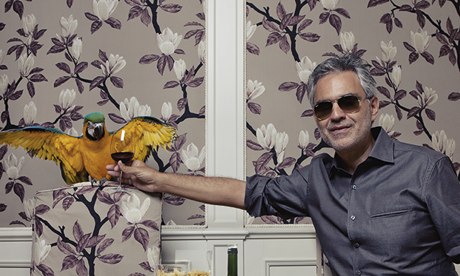
Mamma said that when I was little I refused to eat. I suppose I didn't want to waste time. I was very restless and wanted to run and climb on the agricultural machines my father sold. My mother would run after me with a spoon and try to distract me, so she could put one spoonful of minestra in my mouth.
Mamma certainly wasn't a good cook, but Oriana, a domestic in the house, my second mother, was great, and she bought me my first record, of Franco Corelli. I especially remember sweets on feast days and celebrations – castagnaccio cakes made from chestnut flour and bombolini, small deep-fried doughnuts with vanilla.
We had a farmhouse kitchen in Lajatico in Tuscany. It certainly wasn't in pristine order. But there was a good fireplace and this was my first stage. It had three steps and I'd go up – sometimes with the fire burning – and sing an aria for family and friends sat at the table, while they ate dessert. Today there is my Teatro del Silenzio in Lajatico – an open air theatre, where I sing, one day a year, and the other days there is silence. It's surrounded by hills with agri-tourism resorts where they cook only produce from the farms and the food everywhere is excellent.
I went 200 miles away from home at 12 to be in an institute [for the blind] and this was the most painful point of my life. We were given a quarter litre of wine each day once in middle school, but the food was always dreadful. I didn't like boiled meat but they said: "You will want it – and you will eat it." We slept 64 beds to the room. When I was ill, or pretending to be ill, the food in the infirmary was better, or seemed better.
Despite the all the great successes in my career, and the joys of my family life in adulthood, I have never since experienced the huge happiness I'd get from returning to my family, and my family's food, after the great sadness of school. Such joy came only at the price of such sadness.
I don't want to say anything about becoming blind, because it has nothing to do with enjoyment of food. Sight and taste are separate things. The hunger is just the same for me, of course it is.
At 18 I began performing in piano bars to help pay for my law studies in Pisa and to meet young women. O sole mio, Malafemmena, Love Me Tender … I learned what strikes audiences, what distracts, what irritates. People would come, drink, talk, listen, make requests and smooch. While I sang many love affairs were born.
Being always professional, I can't eat too much, or drink. My diet is very simple. Almost every day I have pasta – only with olive oil; no sauces or butter. I never cook, although as a good Italian I can, of course, make pasta. I always eat as many vegetables as I can. I have some meat, two or three times a week, but no more, because it's dangerous.
The only "rider" I have backstage is for water. Sometimes when I get home from a concert I open a bottle of wine and finish it. I call this "The Happiness Bottle".
I never travelled abroad when young – except to Lourdes – but I've made up for it. There were two things which astonished me in America. One positive – the quality of meat; the taste is extraordinary. The second is negative. There isn't even a halfway decent cup of coffee to be had in the whole of the United States.
I have been to many famous restaurants around the world, but how good a restaurant is dependens on how hungry I am. There was a restaurant near here called Patriarch. It was famous because of the quality of its food but also for how very expensive it was. And I remember it extremely well, because I never went inside. OFM
Andrea Bocelli's Love in Portofino is out now on Decca

